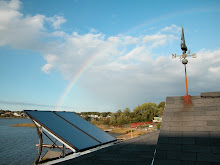Converting your heating system to use radiant heat and an alternative energy source is by far the best way to lower, or even eliminate, your heating cost. For those that are unable to undertake the expensive conversion at this time, I offer six inexpensive tips that can save you a lot of money.
1. Lower your thermostat. For every degree you lower your thermostat, you will save 3% of your heating cost. Lowering your thermostat even further at night will save even more as night time is generally when your house has the greatest heat loss.
2. Humidify your air. Using a simple humidifier can help you save as well. One way your body loses heat is through the evaporation of water from your skin to the air. The drier the air, the more evaporation takes place. A humidifier cuts down on the evaporation and causes you to feel warmer. When you feel warmer, you naturally lower your thermostat.
3. Don't heat the outdoors. Simple, right? Maybe not as simple as you would think. Infiltration, or heat loss from air leaks, accounts for the majority of your heating costs. Search high and low for cracks, holes and gaps. If you feel a draft or can see light coming in, seal it with caulk, weather stripping or insulation. Place insulating "draft socks" at the base of your doors (a rolled up towel works fine.) If you have a garage or enclosed porch, use that as your main entrance in the winter. The enclosure creates a buffer between your heated living area and the cold outside and cuts down on the heat loss compared to a door directly linking your heated space and outside. If this buffer zone is not available, use the smaller of your two doors. Using your 32" side door instead of your 36" front door will save 15% of the heat lost by opening the door. When bringing in your groceries, bring them all in at once. It is better to open the door once for a little longer than several shorter times.
4. Insulate. Adding insulation to your attic (minimum of R30) is simple and will pay for itself quickly in energy savings. The same is true for your pipes. All hot water and heating pipes should be insulated.
5. Have your heating system checked by a professional. A properly adjusted heating plant can operate 10%-20% more efficiently than a poorly maintained unit. A properly adjusted heating plant also minimizes the risk of deadly carbon monoxide seeping into your home.
6. Lower your water temperature. Many codes set a limit of 130 degrees for domestic hot water and some set the limit at 120 degrees. You want to set your water temperature as hot as you can stand it at your kitchen sink without adding cold water (usually 110-115 degrees.) Any hotter and you are wasting energy. It takes 30% more energy to heat water to 130 degrees than to 110 degrees.
I hope these tips are helpful to you. Not only will you save money, you will also reduce your carbon footprint.
Subscribe to:
Post Comments (Atom)

No comments:
Post a Comment